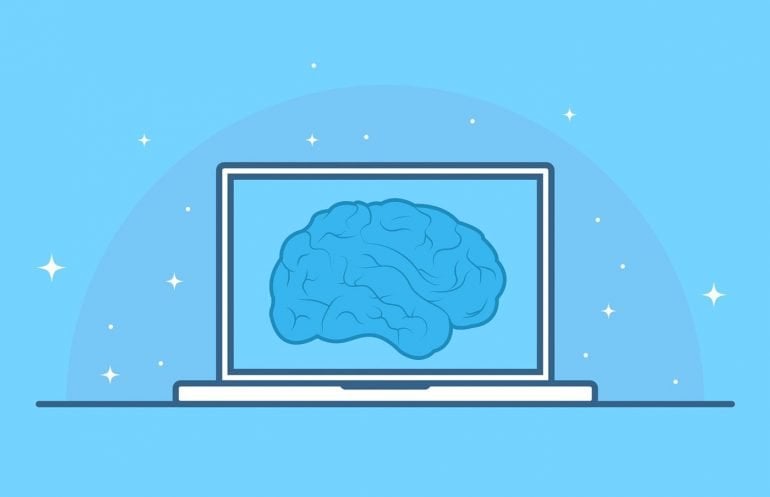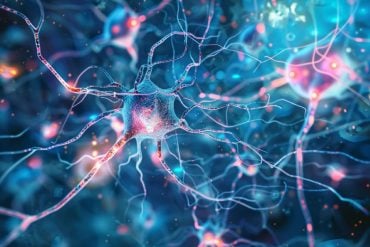Summary: New machine learning technology that researchers have made free online can be used by sleep experts to study the role of K-complex, a brief but prominent pattern of brain activity that lasts around half a second during sleep.
Source: Finders University
Algorithms and deep learning has enabled Flinders University sleep researchers to dive deep into one of the mysteries of sleep health.
They have used machine learning and artificial intelligence to develop a free online tool being used by sleep experts and researchers around the world to work out the role of the so-called K-complex, a prominent, brief up-down-up pattern of brain electro-encephalogram (EEG) electrical activity lasting around half a second during sleep.
When displayed on an EEG screen, it looks a bit like a ‘K’, says Bastien Lechat, lead author on a new Flinders University paper published in Sleep journal.
“We hope this algorithm will help to fast forward new discoveries regarding the mysterious K-complex waveform and its associated health outcomes.”
“A lack of K-complexes has been linked to various clinical problems, such as Alzheimer’s disease and insomnia, suggesting that K-complexes are an important part of normal sleep and health.”
“While the meaning and role of K-complexes is rather unclear, one of the leading theories is that they reflect low-level decision processing to either wake up or stay asleep in response to sensory input during sleep,” says Mr Lechat, from the Adelaide Institute for Sleep Health at Flinders University.
K-complexes occur roughly every two minutes during sleep, so are too labour-intensive for routine sleep scoring.
If K-complexes were considered, it would take an expert sleep technician approximately 0.5 to 1.5 hours longer to score one sleep study.
Manual scoring also comes with a lot of variability, with agreement between expert scorers as low as 50%. The deep learning algorithm to automatically score K-complexes during overnight sleep studies is much faster and more reliable than with manual scoring.
The algorithm takes around 3 minutes to score an entire night of sleep and out-performs all currently available automated methods,” says co-author Dr Branko Zajamsek.
“In addition to its enhanced detection speed and accuracy, the algorithm also gives a ‘confidence’ or probability rating, allowing for more useful comparisons between clear versus ambiguous K-complex signals – as defined by human scoring.
“This makes the sleep scoring output comprehensive, yet very easy to understand compared to other automated methods.”
About this neuroscience research article
Source:
Finders University
Media Contacts:
Bastien Lechat – Finders University
Image Source:
The image is in the public domain.
Original Research: Closed access
“Beyond K-complex binary scoring during sleep: Probabilistic classification using deep learning”. by B Lechat, K Hansen, P Catcheside and B Zajamsek.
Sleep doi:10.1093/sleep/zsaa077
Abstract
Beyond K-complex binary scoring during sleep: Probabilistic classification using deep learning
Study Objectives
K-complexes (KCs) are a recognized electroencephalography marker of sensory processing and a defining feature of sleep stage 2. KC frequency and morphology may also be reflective of sleep quality, aging, and a range of sleep and sensory processing deficits. However, manual scoring of K-complexes is impractical, time-consuming, and thus costly and currently not well-standardized. Although automated KC detection methods have been developed, performance and uptake remain limited.
Methods
The proposed algorithm is based on a deep neural network and Gaussian process, which gives the input waveform a probability of being a KC ranging from 0% to 100%. The algorithm was trained on half a million synthetic KCs derived from manually scored sleep stage 2 KCs from the Montreal Archive of Sleep Study containing 19 healthy young participants. Algorithm performance was subsequently assessed on 700 independent recordings from the Cleveland Family Study using sleep stages 2 and 3 data.
Results
The developed algorithm showed an F1 score (a measure of binary classification accuracy) of 0.78 and thus outperforms currently available KC scoring algorithms with F1 = 0.2–0.6. The probabilistic approach also captured expected variability in KC shape and amplitude within individuals and across age groups.
Conclusions
An automated probabilistic KC classification is well suited and effective for systematic KC detection for a more in-depth exploration of potential relationships between KCs during sleep and clinical outcomes such as health impacts and daytime symptomatology.
Feel Free To Share This AI News.








